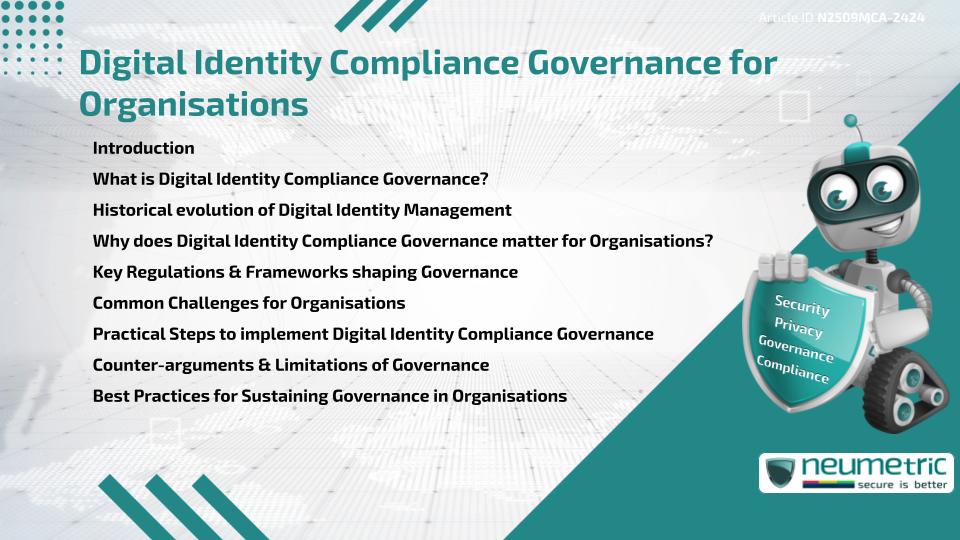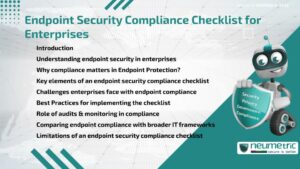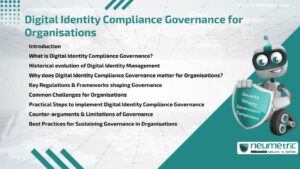Table of Contents
ToggleIntroduction
Digital Identity Compliance Governance refers to the Frameworks, Regulations & Policies that organisations must follow to ensure digital identities are managed securely, legally & ethically. It involves protecting User credentials, verifying access rights & complying with international & national laws that govern Data Security & Privacy. For organisations, Digital Identity Compliance Governance is essential to prevent Fraud, maintain Trust & meet Regulatory obligations. This article explores the meaning of Digital Identity Compliance Governance, its historical roots, why it matters, the Regulatory frameworks involved, common challenges & actionable strategies for organisations.
What is Digital Identity Compliance Governance?
Digital Identity Compliance Governance is the structured approach to managing how digital identities are issued, authenticated, stored & used within an organisation. It ensures that every identity-whether belonging to an Employee, Partner or Customer-is protected under both Technical safeguards & Legal standards.
In simple terms, it is like a passport system for the digital world. Just as governments regulate passports to confirm a person’s identity & travel rights, organisations must regulate digital identities to confirm User legitimacy & Control access.
Historical evolution of Digital Identity Management
The concept of Digital Identity management began in the early days of corporate IT systems when organisations relied on passwords & directories to manage access. Over time, the rise of E-commerce, Cloud computing & remote work created new challenges for identity security.
Standards like OAuth, SAML & OpenID Connect were introduced to support secure identity federation. Governments also began enacting Privacy & Identity regulations such as the General Data Protection Regulation [GDPR] in the European Union, placing strict requirements on how digital identities & associated Personal Data must be handled.
Why does Digital Identity Compliance Governance matter for Organisations?
Organisations face several critical reasons to prioritise Digital Identity Compliance Governance:
- Regulatory Compliance: Many jurisdictions mandate strict identity protection under Data Protection & Cybersecurity laws.
- Fraud prevention: Strong Governance reduces the Risk of identity theft, phishing & unauthorised access.
- Trust & reputation: Customers & Stakeholders expect secure management of their digital identities.
- Operational efficiency: Governance ensures consistent identity processes, reducing errors & system misuse.
- Security resilience: Proper Governance limits insider Threats & strengthens Access Control.
Without effective Governance, organisations Risk fines, Data Breaches & Reputational damage that can take years to repair.
Key Regulations & Frameworks shaping Governance
Several key regulations & standards influence Digital Identity Compliance Governance:
- GDPR (European Union): Sets strict Data Protection & identity management rules.
- NIST Digital Identity Guidelines (United States): Provides Best Practices for Digital Identity proofing & Authentication.
- eIDAS Regulation (European Union): Governs electronic identification & trust services.
- ISO/IEC 27001: Provides a global Framework for Information Security management, including identity controls.
- PCI DSS (Global): Requires secure identity management for payment systems.
These frameworks provide the foundation for organisations to align with both security Best Practices & legal Compliance.
Common Challenges for Organisations
Implementing Digital Identity Compliance Governance is not without obstacles:
- Complexity of regulations: Different countries impose varying & sometimes conflicting, requirements.
- Evolving Threats: Attackers continuously develop new methods to exploit identities.
- Integration issues: Legacy systems may not support modern identity standards.
- High implementation costs: Strong Governance frameworks can require significant investment.
- User resistance: Employees or Customers may resist stricter Authentication methods.
Organisations must navigate these challenges while maintaining usability & security.
Practical Steps to implement Digital Identity Compliance Governance
Organisations can follow these steps to establish effective Governance:
- Conduct Identity Audits to assess current practices & Risks.
- Define Governance Policies that align with Legal & Regulatory requirements.
- Implement Multi-factor Authentication [MFA] to strengthen Access Control.
- Adopt modern identity standards like OAuth & OpenID Connect for secure interoperability.
- Train Employees on secure Identity Practices & Compliance responsibilities.
- Regularly review & update Policies to match evolving Threats & Regulations.
- Engage Third Party experts where internal expertise is lacking.
By taking these steps, organisations can build a sustainable Compliance Governance model.
Counter-arguments & Limitations of Governance
Some critics argue that Digital Identity Compliance Governance can slow down operations by adding extra Authentication layers or requiring complex Regulatory reviews. Others point out that Governance may be costly for smaller organisations & may not keep pace with rapidly evolving Threats.
However, these criticisms overlook the severe Risks of weak identity Governance, including Breaches, Fraud & non-Compliance fines. The cost of implementing Governance is generally far lower than the Financial & Reputational losses of non-Compliance.
Best Practices for Sustaining Governance in Organisations
To maintain effective Digital Identity Compliance Governance over time, organisations should:
- Foster a culture of Security Awareness & Accountability.
- Integrate Governance into broader Cybersecurity & Risk Management strategies.
- Automate Compliance monitoring where possible.
- Partner with trusted Identity Providers & Technology Vendors.
- Participate in industry initiatives to stay updated on Standards & emerging Threats.
Long-term sustainability depends on making Governance a continuous process rather than a one-time project.
Conclusion
Digital Identity Compliance Governance is essential for organisations seeking to Secure Access, comply with Legal Frameworks & build Trust with Stakeholders. While challenges & costs exist, the benefits of reduced Risk, legal Compliance & improved resilience far outweigh the limitations.
Takeaways
- Digital Identity Compliance Governance ensures secure, lawful & ethical management of digital identities.
- It has evolved alongside internet growth, cloud computing & regulatory enforcement.
- Key regulations include GDPR, NIST guidelines & eIDAS.
- Challenges include Regulatory complexity, evolving Threats & high Costs.
- Sustainable Governance requires cultural integration, automation & Continuous Improvement.
FAQ
What is Digital Identity Compliance Governance?
It is the structured approach organisations use to manage digital identities securely while complying with laws & regulations.
Why is Digital Identity Compliance Governance important?
It protects against fraud, ensures Legal Compliance, improves Trust & strengthens overall Security.
Which frameworks guide Digital Identity Compliance Governance?
GDPR, NIST Digital Identity Guidelines, eIDAS, ISO/IEC 27001 & PCI DSS.
What challenges do organisations face in implementing Governance?
They face evolving Threats, integration with Legacy Systems, high Costs & Regulatory complexity.
How can organisations implement Governance effectively?
Through Audits, clear Policies, MFA, modern standards, Employee Training & Policy reviews.
Is Governance the same as security?
No, Governance provides the rules & oversight, while security involves the technical controls to enforce those rules.
Can smaller organisations achieve Governance Compliance?
Yes, by adopting scalable tools, prioritising critical areas & leveraging external expertise.
Need help for Security, Privacy, Governance & VAPT?
Neumetric provides organisations the necessary help to achieve their Cybersecurity, Compliance, Governance, Privacy, Certifications & Pentesting needs.
Organisations & Businesses, specifically those which provide SaaS & AI Solutions in the Fintech, BFSI & other regulated sectors, usually need a Cybersecurity Partner for meeting & maintaining the ongoing Security & Privacy needs & requirements of their Enterprise Clients & Privacy conscious Customers.
SOC 2, ISO 27001, ISO 42001, NIST, HIPAA, HECVAT, EU GDPR are some of the Frameworks that are served by Fusion – a SaaS, multimodular, multitenant, centralised, automated, Cybersecurity & Compliance Management system.
Neumetric also provides Expert Services for technical security which covers VAPT for Web Applications, APIs, iOS & Android Mobile Apps, Security Testing for AWS & other Cloud Environments & Cloud Infrastructure & other similar scopes.
Reach out to us by Email or filling out the Contact Form…





